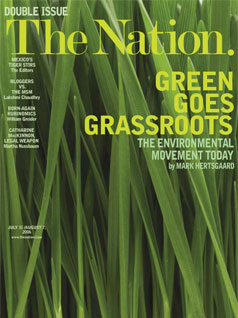 Mark Hertsgaard’s cover story in The Nation this week is a long look at the current fortunes and reconfigurations of the environmental movement: "Green Goes Grassroots."
Mark Hertsgaard’s cover story in The Nation this week is a long look at the current fortunes and reconfigurations of the environmental movement: "Green Goes Grassroots."
To eco-geeks like yours truly, it’s a familiar story: the movement realizes it’s gotten top-heavy and D.C.-centric, too reliant on wonky techno-language, too depressing, and too insular. So it is:
- pouring more money and resources into supporting local organizing;
- trying to speak in simple language;
- focusing on solutions and can-do spirit; and
- creating alliances with a variety of other interest groups.
I’ve heard all this before. My worry has been that it is, in a phrase made famous by hapless terrorist wannabes loudly arrested by the Bushies in the run-up to the mid-terms, "more aspirational than operational." Hertsgaard’s piece does marshal some solid examples, but not quite enough to make a convincing case there’s a real, broad, sustained change taking place. I hope there is.
The piece touches briefly on a subject that’s extremely important and too-little-discussed inside the movement (for obvious reasons): the role of foundations. This captures the problem well:
… national activists complain that national funders, especially foundations, have resisted [grassroots organizing] in favor of quick-fix solutions. “Funders have very short time spans and want to see measurable results, and you can’t build the kind of [movement we envision] in a short period of time,” says Rebecca Wodder, president of American Rivers. Carl Pope says the Sierra Club is now “in partnership with the United Steelworkers, the biggest industrial union in America, to go into a number of states and try to create a class-blind environmental movement.” But foundations have declined to fund the initiative because it cannot promise specific policy outcomes within the next two years, says Pope, who adds, “I assure you, not a single important right-wing funder in this country thinks that way.”
Some $2.8 billion is donated every year to progressive service and advocacy groups in the United States, according to Democracy Alliance, a group of nonfoundation donors and activists who are working to fortify the progressive infrastructure. Only $500 million of that money, about 18 percent, goes to groups that work locally. Within the environmental field, activist groups receive a total of $1.7 billion a year, of which only $187 million–barely 10 percent–goes to groups that work at the local level. (By far the largest portion of environmental funding goes to land trusts, which buy and protect land that is environmentally or aesthetically valuable.) “Those numbers show what is readily apparent when you look around Washington, DC,” says John Passacantando, executive director of Greenpeace USA. “This is a top-heavy movement. You need lobbyists and experts, sure, but not as many as we have. Look at the National Rifle Association. They know that power is built in the field, so they focus on individual Congressional districts…. The difficulty is, organizing is not sexy. It doesn’t get you headlines in the New York Times. It is scruffy, dirt-under-the-fingernails power building.”
“In-depth organizing is a hard sell to national foundations,” says Bill Roberts, president of the Beldon Fund, which underwrote the organizing in Michigan. Roberts does not bring up the following example but does confirm it when asked: After some environmental groups finally began to collaborate with other progressive organizations during the 2004 election campaign, Roberts tried to convince other funders to help him keep the best parts of the infrastructure in place for future work. His appeal was rejected. “Some funders were persuaded,” he recalls. “But many others wanted to know what specific activities would be developed and implemented in 2005 before committing funds.”
As if to confirm all the accusations, a foundation representative pops up in the next paragraph:
Joshua Reichert, managing director of the policy initiatives and environment program at the Pew Charitable Trusts, counters that it is unreasonable to ask foundations to underwrite long-term organizing. Arguing that the current state of the movement is “reasonably strong,” Reichert charges that green groups are themselves responsible for any lack of grassroots organizing: “Most of these groups get more of their money from memberships [in dues] than they do from foundations. Groups can pour that money back into organizing, if they choose to. Foundations put money in when they’re interested in a specific program a group is doing.”
As Carl Pope said mere paragraphs ago, funders on the right don’t think this way. They fund long-term movement building, throwing tons of money on the ground and waiting to see what grows up. It’s been pretty successful, you may have noticed. I hope someone takes a sustained journalistic look at the progressive foundations soon, because this is a game-stopper of a problem. Problem is, most anybody in a position to understand and write about the problem depends on those very foundations for funding, so …
Now that we’re down at the bottom and nobody’s reading any more, let me mention two things that bugged me:
- Can we please, please stop hyping the crap out of the Apollo Alliance until it produces something other than pleasing rhetoric? In the story, new Apollo president Jerome Ringo says, "Apollo began five years ago as a vision. My goal is to turn it into action.” Five years later? Good thought!
- The piece contains a discussion of "The Death of Environmentalism" without linking to our definitive coverage thereof, and a discussion of environmental justice without linking to our Poverty & the Environment series. Call me petty — seriously, call me petty, cause this is really petty — but c’mon!



